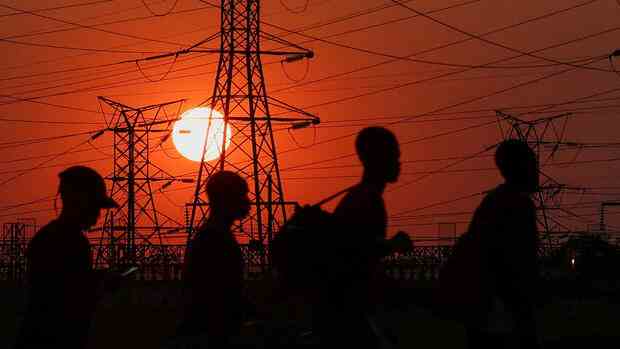The chronic power outages are paralyzing the country and its economy.
(Photo: Reuters)
Johannesburg The fourth German-African Economic Summit in Johannesburg had an unexpected success right from the start: Thanks to the presence of South Africa’s head of state Cyril Ramaphosa, interest in the event was greater than it had been for a long time.
Local and national media report. After all, it is Ramaphosa’s first public appearance after his near-resignation last week – at least for the time being he puts an end to all speculation as to whether the 70-year-old may not be leaving his post prematurely because of a corruption scandal that has escalated into a state crisis.
Ramaphosa was recently described by various observers as exhausted and tired of office. But not only that.
Just last week, the commission of experts convened to clarify the allegations against Ramaphosa came to the conclusion that the head of state had illegally hoarded a large sum of money on his game farm in the north of the country. He clearly mixed up his office as president with business interests, which the constitution expressly prohibits.
Top jobs of the day
Find the best jobs now and
be notified by email.
Ramaphosa himself has repeatedly denied all allegations and will now have the report legally reviewed. Although this has bought him time, the allegations continue to weigh heavily on his presidency.
Regardless of how things unfold, the damage to Ramaphosa is likely to be immense. Political commentator Richard Calland, who has just written a book on South Africa’s five presidents since the end of apartheid, already sees him as a “lame duck” president, a head of state with no real power.
In a country with youth unemployment of more than 60 percent, the president, who has become fabulously rich thanks to his political connections, has long been considered withdrawn and increasingly removed from reality.
The head of government faces fierce allegations of corruption.
(Photo: Reuters)
Like the publicist Calland, more and more observers are criticizing his indecisiveness and his reluctance to liberalize the economy, which is so tightly controlled by the state, which is urgently needed. The symptoms of the crisis are omnipresent, for example in ever more severe power cuts and rampant corruption in everyday life. Ramaphosa has been accused of being reluctant to fight nepotism.
This is exactly what Robert Habeck could be aiming for when he opens the economic summit on Tuesday and pays a visit to the ailing state electricity company Eskom the following day. The company’s mismanagement by the ruling African National Congress (ANC) is believed to be a major cause of the current misery in the Cape.
>> Read more about this: Why Economics Minister Habeck Africa sets
This year, power in South Africa has already been cut for a few hours on more than 170 days. It’s currently five hours a day. In mid-September, production even had to be cut back by a record 6,000 megawatts, which meant eleven hours without electricity per day – devastating for Africa’s only industrialized country.
Up to the turn of the millennium, Eskom was one of the largest and most profitable electricity producers in the world. But then the ANC used the group to provide veteran members with high-paying management positions. In turn, many white technicians have been fired because of the government-enacted “black empowerment” that prioritized race over qualifications.
Many German medium-sized companies criticize the increasingly strict regulations, which should actually serve to strengthen the economic situation of the majority of the population who were disadvantaged under apartheid, but which, because of their misuse, now often have the opposite effect.
The Federal Minister of Economics will open the German-African Economic Conference in Johannesburg on Tuesday.
(Photo: dpa)
The bill for the ideological rigidity of the government is not just being paid by the country itself. German investors, such as the airplane seat manufacturer Recaro, are also suffering because they have to upgrade their production facilities at great expense.
Even if all the lights don’t go out in the Cape, the massive power cuts are likely to hit the economy, which was already badly hit before Corona, hard – and suffocate all hopes of growth. The political and economic specialist Daniel Silke puts it bluntly: “In view of the ongoing energy crisis, South Africa can shelve an economic recovery. It is a self-inflicted crisis for which, once again, no one is taking political responsibility.”
>> Read also: EU supports South Africa’s green energy transition – but buys more and more coal there
But there is also hope. Interest in Africa’s wealth of raw materials is growing worldwide, and the energy sector is being opened up to private electricity providers. And so representatives of many German companies speak of Africa as a “continent of opportunity”.
One of them is Heinz-Walter Große, head of the medical manufacturer B. Braun Melsungen, who has long been in charge of the sub-Saharan Africa initiative of the German business associations (Safri) and in connection with this also presides over the economic summit in Johannesburg.
It is clear, however, that Germany’s economic relations with the 48 countries south of the Sahara can be greatly expanded: The German trade volume was recently a meager 26 billion euros – about as much as that with Slovakia and only a sixth of the trade exchange that Germany has with neighboring countries Netherlands scored.
More: Africa offers solutions to the current crises
